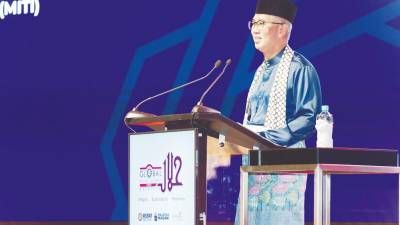KUALA LUMPUR: Global trade rules need a “reset” and should not be driven by short-term fixes or exclusive blocs, said Investment, Trade and Industry Minister Tengku Datuk Seri Zafrul Tengku Abdul Aziz.
He noted that recent months have demonstrated how no nation can stand alone, with geopolitics and geoeconomics now deeply intertwined.
“The global trading system needs a reset. It cannot rely on stop-gap measures, nor should it revolve around the creation of new ‘clubs’. It must be about reimagining the entire architecture,” he said in his opening remarks at the official launch of the Global Halal Summit 2025 and the Malaysia International Halal Showcase 2025 (Mihas 2025) today.
Tengku Zafrul cited Malaysia’s recent tariff negotiations with the United States as an example of the challenges faced under the current system. “The Malaysia-US tariff negotiations were complex and challenging. Among the issues raised was Malaysia’s halal certification, which was considered a non-tariff barrier.”
He called for reforms to multilateral institutions such as the World Trade Organization, including the restoration of its appellate body to inject greater certainty and fairness into trading rules. He also urged modernisation of these rules to encompass digital trade, sustainability standards and the role of state-owned enterprises.
Tengku Zafrul stressed that more developing economies must be included in the rule-making process to ensure inclusivity and equity in trade – principles he said align with the halal economy’s ethos of fair commerce.
As a second priority, Tengku Zafrul proposed stronger cooperation mechanisms between economic blocs. This would involve promoting “supply chain diplomacy” and exploring multilateral currency strategies for strategic sectors such as semiconductors, energy, critical minerals and food.
Given how deeply trade and supply chains are interconnected, he said, they must serve as stabilising forces rather than being used as “blackmail tools.”
His third proposal focused on embedding ethical and sustainable principles – now standard in goods and services – into trade agreements and supply chains.
Tengku Zafrul said Malaysia is ready to lead this effort by positioning halal as a trust-based trade framework that transcends geographical and religious boundaries.
“Malaysia is uniquely positioned to play a catalytic role in resetting the global trading system through the halal economy. We can do this not just as a supplier, but also as a standard-setter, system-builder, and bridge-maker for ethical trade,” he added.
The minister also highlighted Malaysia’s potential role in shaping South–South trade ecosystems, noting that the Global South accounts for 85% of the world’s population and includes almost all Muslim-majority countries, making it a key market for halal.
Halal’s emphasis on high standards, quality, ethics and sustainability, he added, would also support the developmental needs of the region.
“By catalysing Asean’s free trade agreement negotiations with Australia, China, India, the Gulf Cooperation Council and others, Malaysia is helping to build interoperable halal value chains across Asean, the Middle East and Africa,” Tengku Zafrul said.
On Mihas 2025, he reported that in just the first two days, the event recorded RM4.1 billion in sales. “This year, with participants from 80 countries, 300 global buyers and 45,000 trade visitors, Mihas is on track to meet its RM4.5 billion sales target.”
Since its inception in 2004, Mihas has generated nearly RM30 billion in export sales.
